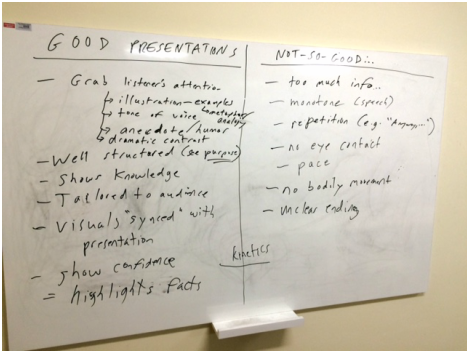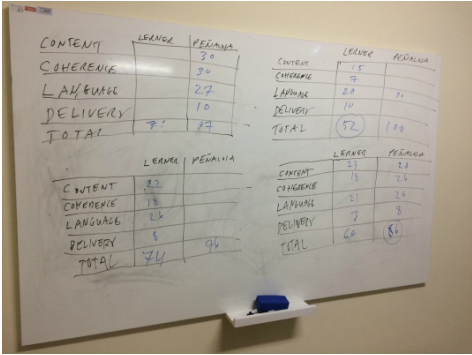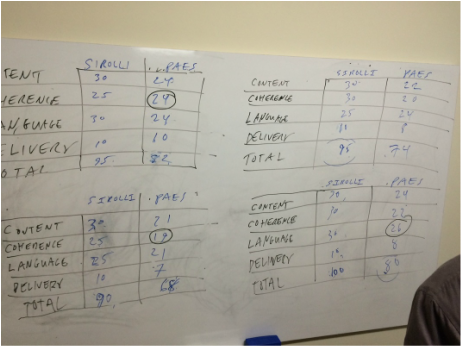Língua Inglesa Oral IV (HE 281)
PROFESSOR: Dr. Ron Martinez
OFFICE: Reitoria 1014
OFFICE: Reitoria 1014
CLASS DOCUMENTS
READINGS
Carter, R. & McCarthy, M. (2015). Spoken grammar: Where are we and where are we going? Applied Linguistics. doi:10.1093/applin/amu080
Rajadurai, J. (2007). Intelligibility studies: A consideration of empirical and ideological issues. World Englishes, 26(1), pp. 87-98.
Patri, M. (2002). The influence of peer feedback on self-and peer-assessment of oral skills. Language Testing, 19(2), 109-131.
Chen, Y. M. (2008). Learning to self-assess oral performance in English: A longitudinal case study. Language Teaching Research, 12(2), 235-262.
Ross, S. (1998). Self-assessment in second language testing: A meta-analysis and analysis of experiential factors. Language testing, 15(1), 1-20.
Rajadurai, J. (2007). Intelligibility studies: A consideration of empirical and ideological issues. World Englishes, 26(1), pp. 87-98.
Patri, M. (2002). The influence of peer feedback on self-and peer-assessment of oral skills. Language Testing, 19(2), 109-131.
Chen, Y. M. (2008). Learning to self-assess oral performance in English: A longitudinal case study. Language Teaching Research, 12(2), 235-262.
Ross, S. (1998). Self-assessment in second language testing: A meta-analysis and analysis of experiential factors. Language testing, 15(1), 1-20.
CLASS CALENDAR (click here if calendar does not load)
PLEASE NOTE THAT THIS CALENDAR WILL NOW BE ALTERED DUE TO THE STRIKE
WEEK 1 (3 & 5 AUGUST 2015)
"Friends" videoWatch the "Friends" video and make notes on the following questions. Be sure to bring your notes to the next class.
TAKE THE QUESTIONNAIRE!If the questionnaire does not appear here automatically, then click here.
RAJADURAI 'INTELLIGIBILITY' ARTICLEMake notes on the following questions, and bring your notes to class.
JACKIE CHAN VIDEOWatch the video and make notes on the following questions and bring your answers to class.
WEEK 2 (10 & 12 AUGUST 2015)
|
VIDEOS"FRIENDS" - HOW FLUENT IS CHANDLER?
JACKIE CHAN AND "INTELLIGIBILITY"
PECHA KUCHA EXAMPLE
PECHA KUCHA EXAMPLE IN PORTUGUESE
"IGNITE" TALK (SIMILAR TO PECHAKUCHA): "How to break up with someone on Twitter"
EXAMPLE OF 'DYSFLUENCIES' AND PECULIARITIES OF SPOKEN LANGUAGE: MISS TEEN USA 2007
'CELEBRITY GRAMMAR COPS': GOOD ACTIVITY?HOW TO USE THE COCA CORPUS: AN INTRODUCTIONA PRESENTATION IN MICROCOSMIC, DRAMATIC FORMCONTRASTING TALKSFORMER MAYOR OF CURITIBA ON URBAN DESIGN
FORMER MAYOR OF BOGOTÁ ON URBAN DESIGN
ERNESTO SIROLLI: 'SHUT UP AND LISTEN!'4 COMMANDMENTS OF CITIES: EDUARDO PAESPOWERPOINT 'DON'T's'HOW NOT TO BE IGNORANT ABOUT THE WORLD''WHAT WE LEARNED FROM 5 MILLION BOOKS'GISELE BUNDCHEN CBS INTERVIEW (NOV. 2015)Consider Gisele's English in light of the article on age and second language acquisition that you read. Is her proficiency evidence in support of or against the position of the research you read?
|



